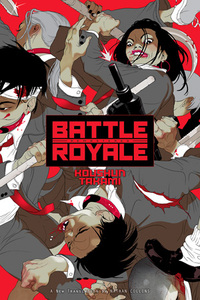Take a photo of a barcode or cover
Nie chcę nic mówić ale zakończenie było zbyt przewidywalne, w zasadzie już po scenie w szkole można było wywnioskować kto wygra xD
This book is very well written. Koushun Taskami grasped the concept of the deaths and how to students would react very well. This is a book that is definitely worth reading. The deaths are very detailed so if you have a weak stomach, you are now forewarned :). This book keeps you reading until the end without stopping. I definitely recommend this book to people who enjoy this kind of thing.
dark
tense
medium-paced
Plot or Character Driven:
A mix
Strong character development:
Complicated
Loveable characters:
Complicated
Diverse cast of characters:
No
Flaws of characters a main focus:
No
adventurous
challenging
dark
tense
medium-paced
This book was a fun read for me because I view the movie in a nostalgic way. I watched it again after finishing the book, and while it has a few weird changes from the source, overall it's a great adaptation. However, the fact that "Born to Run" didn't play at the end felt like a crime.
Unlike modern young adult dystopias, this story leans into the violence. It doesn't spend half its time making excuses for why these kids turned into animals. It doesn't focus on the society that built them or parents that were unable or incapable of raising them. It doesn't give anyone a good reason to kill other than survival. These kids are products of their environment. However, by not centering the narrative around the fascist society, it makes these kids more responsible for their own actions. When one kid kills another, it doesn't feel like it was the result of the game or government; it feels like they were broken by their own thoughts and actions.
I would recommend this to fans of horror and Japanese literature. I think anyone who recommends this to a Hunger Games fan is just setting them up for disappointment.
Unlike modern young adult dystopias, this story leans into the violence. It doesn't spend half its time making excuses for why these kids turned into animals. It doesn't focus on the society that built them or parents that were unable or incapable of raising them. It doesn't give anyone a good reason to kill other than survival. These kids are products of their environment. However, by not centering the narrative around the fascist society, it makes these kids more responsible for their own actions. When one kid kills another, it doesn't feel like it was the result of the game or government; it feels like they were broken by their own thoughts and actions.
I would recommend this to fans of horror and Japanese literature. I think anyone who recommends this to a Hunger Games fan is just setting them up for disappointment.
I can understand why this novel spawned a genre. It’s entertaining and certainly promising, but ultimately the author just wasn’t up to the task. Every decent writer who read it probably said, “I could do better,” and then did.
For starters, the entire premise requires a suspension of disbelief that similar titles, like the Hunger Games, didn’t require. There is no logical reason for why the government would send kids to this island to kill eachother.
If it was really for psychological research, they’d do it to adults. If it was to cull the amount of children entering high school, why make them kill eachother? Why not just kill them in masse, Nazi-style? It’s just a randomly selected class, too, so it’s not to filter out the best of the best. Sakamochi says it’s to instill fear of rebellion into the people. Why wouldn’t they broadcast the whole thing to the public, then? You’re meaning to tell me that this thing they do secretly, that they conduct without the citizens’ knowledge and only tell them about after the game is completed, is supposed to instill fear and distrust in the citizens?
This author also simply cannot write women. Every other girl has a crush on Shuya. Every time we flash to a girl they’re thinking about what their crush is doing, crying over their crush. Some of the boys are boiled down to crying “I couldn’t save this girl I barely ever spoke to,” too, but with the girls it’s just incessant. I understand they’re only in middle school, and it would make sense with a handful—but the fact that every girl only thinks about her crushes and has no concerns about the safety of their actual friends is ridiculous. The only girl with a semblance of a single personality trait is Mitsuko.
There’s also some clear author hang ups about sex work, which isn’t surprising for a novel written in 90s Japan, but I figured I should mention it. The little girls who have been roped into a prostitution ring by their friend are not viewed as victims—instead they are framed as whores, delinquents, and generally cutthroat, evil women.
In terms of the boys’ writing—there are so many Mary Sues. Shuya is borderline, but the real atrocious examples are Shogo, Kazuo and Shinji. Shinji especially knows everything. He is omniscient. He is capable of reconstructing exact events that he never witnessed simply through the power of deductive reasoning. He is good at everything. He’s a genius and a star athlete and a computer whiz. He’s smart enough to hack into a government database and make a bomb from almost scratch. He took probably 20 bullets to the chest and still didn’t die. The same goes for Shogo, who, along with inexplicably knowing everything he needs to know to escape the island and defect to America at 16, is able to handle a fatal gunshot wound for long enough to kill an entire fleet of soldiers and then dramatically collapse on the ground.
The author seems to actively avoid compelling writing in order to keep Shuya out of any situation that might question his position as a pure, morally-good character. Hiroki comes to the lighthouse where all 6 girls are murdered, but Shuya conveniently escaped before he gets there. It would have been so interesting if he found Shuya with all those dead girls. Shuya would have finally had to make an actually tough decision, to kill his friend or somehow escape—but the author copped out of anything even slightly morally gray (which is impressive, in a book about kids killing eachother).
I dunno. It has some really good moments, but it’s also incredibly repetitive with one-dimensional character writing and weird takes on women. I give the author props for being one of the firsts of this genre, but I can’t say he’s written one of the best.
For starters, the entire premise requires a suspension of disbelief that similar titles, like the Hunger Games, didn’t require. There is no logical reason for why the government would send kids to this island to kill eachother.
If it was really for psychological research, they’d do it to adults. If it was to cull the amount of children entering high school, why make them kill eachother? Why not just kill them in masse, Nazi-style? It’s just a randomly selected class, too, so it’s not to filter out the best of the best. Sakamochi says it’s to instill fear of rebellion into the people. Why wouldn’t they broadcast the whole thing to the public, then? You’re meaning to tell me that this thing they do secretly, that they conduct without the citizens’ knowledge and only tell them about after the game is completed, is supposed to instill fear and distrust in the citizens?
This author also simply cannot write women. Every other girl has a crush on Shuya. Every time we flash to a girl they’re thinking about what their crush is doing, crying over their crush. Some of the boys are boiled down to crying “I couldn’t save this girl I barely ever spoke to,” too, but with the girls it’s just incessant. I understand they’re only in middle school, and it would make sense with a handful—but the fact that every girl only thinks about her crushes and has no concerns about the safety of their actual friends is ridiculous. The only girl with a semblance of a single personality trait is Mitsuko.
There’s also some clear author hang ups about sex work, which isn’t surprising for a novel written in 90s Japan, but I figured I should mention it. The little girls who have been roped into a prostitution ring by their friend are not viewed as victims—instead they are framed as whores, delinquents, and generally cutthroat, evil women.
In terms of the boys’ writing—there are so many Mary Sues. Shuya is borderline, but the real atrocious examples are Shogo, Kazuo and Shinji. Shinji especially knows everything. He is omniscient. He is capable of reconstructing exact events that he never witnessed simply through the power of deductive reasoning. He is good at everything. He’s a genius and a star athlete and a computer whiz. He’s smart enough to hack into a government database and make a bomb from almost scratch. He took probably 20 bullets to the chest and still didn’t die. The same goes for Shogo, who, along with inexplicably knowing everything he needs to know to escape the island and defect to America at 16, is able to handle a fatal gunshot wound for long enough to kill an entire fleet of soldiers and then dramatically collapse on the ground.
The author seems to actively avoid compelling writing in order to keep Shuya out of any situation that might question his position as a pure, morally-good character. Hiroki comes to the lighthouse where all 6 girls are murdered, but Shuya conveniently escaped before he gets there. It would have been so interesting if he found Shuya with all those dead girls. Shuya would have finally had to make an actually tough decision, to kill his friend or somehow escape—but the author copped out of anything even slightly morally gray (which is impressive, in a book about kids killing eachother).
I dunno. It has some really good moments, but it’s also incredibly repetitive with one-dimensional character writing and weird takes on women. I give the author props for being one of the firsts of this genre, but I can’t say he’s written one of the best.
dark
emotional
tense
medium-paced
Plot or Character Driven:
Character
Strong character development:
Yes
Loveable characters:
Yes
Diverse cast of characters:
No
Flaws of characters a main focus:
Complicated
dark
emotional
sad
tense
fast-paced
Plot or Character Driven:
A mix
Strong character development:
Complicated
Loveable characters:
Complicated
Diverse cast of characters:
N/A
Flaws of characters a main focus:
No
dark
emotional
sad
tense
fast-paced
Plot or Character Driven:
Character
Strong character development:
No
Loveable characters:
Yes
Diverse cast of characters:
Yes
Flaws of characters a main focus:
No
Idk maybe it’s just a bad translation but I found it kind of bland.



